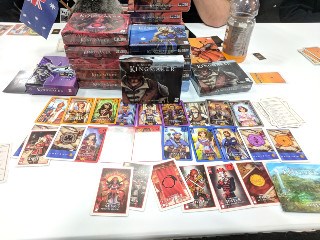
Board @ PAX: Kingdom of Aer Kingmaker
Board @ PAX: Kingdom of Aer Kingmaker
So, you liked the first review and are clamouring for more? You thought I was too nice to the first game and want to hear a less favorable review instead? Or maybe you're tired of the inner monologue I give the beginning of these pieces. Well, too bad on that last account as I will never stop the inner monologues that plague these reviews. But I can give you a second review that might not be as rosy as the first review. And definitely will not be up for any game of the year awards any time soon.
Kingdom of Aer: Kingmaker is a player elimination and bluffing game from Allan Chesher. His first foray into the board gaming world, Kingmaker follows the lives of the five Great Houses of Aer as they attempt to win the throne following the death of the king. Along the way, the each family attempts to scheme and murder the other families' court of three so that they are assured their place on the throne. The last family standing at the end, wins.
As before, I think it's best to start with the quality of the components and the craftsmanship that went into the production of the game. This is probably the only place that Kingdom of Aer really does anything for me. The cards aren't the highest quality cards, but the artwork on the cards is very well done. Each family has unique members of the court and each of those members were beautifully illustrated. However, other than the cards, there's really nothing else to this game that I can discuss regarding components.
Kingdom of Aer: Kingmaker is played across two phases, a card selection phase and a resolution phase. After setting up each family with the three members of their court in front of them, the game begins. In the card selection phase, players select one of their available cards to play face down in front of them. The choices are:
- Jester: This person will join your court (giving you 4 members that must be assassinated)
- Attack: Vote cards for who to assassinate that round
- Seer: All votes to assassinate a member of your court count as non-votes.
- Marshalls: Remove all banners that are in play
- Gold: Let's a player buy back one of their used roles
- Thief: Steals the gold your opponent wants to play so that they can't buy back a card
- Banner: Your votes count as 2 for the purposes of who to assassinate
- Fanatic: Anyone who votes to attack you instead has one of their own assassinated
After all players have played their card for the round, the choices are revealed. Following the order on the play card (which is the order of the cards listed above), the individual cards are resolved. For the attack cards, each team has one attack card that is the color of another family in the game. Each attack card counts as one vote (unless a banner is in play) and the family who has the most votes loses a member of their court. In the case of a tie, all families lose one member of their court. Then, the round is over and you go back to the card selection phase of the game.
So, that's Kingdom of Aer: Kingmaker in a nutshell. And I guess now is the time that I launch into my rants of why I would not suggest this game for anyone to play. First off, the rules are very simple, and yet still not clearly worded. For instance, the Seer card directly affects the Attack cards (causing all attack cards matching your family's color to be counted as 0 votes). The problem is that the Seer card is mentioned just after the Attack cards are on the turn order. So, do you count up the attacks and then remove the cards that are your color? But right after the Seer is the Marshalls who also can affect attack score since they remove banners (which double your vote). So, do Marshalls effect occur when the vote is tallied (like the Seer) or does a person get off their double vote and then the Marshalls card is resolved? Same happens with the Thief and Gold cards. They are in the order of spend gold then steal gold. Why wouldn't the rules just have the Thief card before in the order and they can steal a player's gold before anyone buys back cards? Simple things like this make me think the game wasn't really thought through or play tested as much as it could have been.
Second big rant, and you'll learn this as we move forward with the Board @ PAX series, I simply loathe all games that have elimination mechanics. But this takes it a step further, because if you get behind early with a quick assassination to one of your people, you usually have to start playing non-Attack cards to right the ship. But while you're doing that, your opponents are able to keep playing Attack cards on you causing you to fall further behind. And there's not a really good catch-up mechanic in the game. So not only will you be eliminated, you know pretty early on if you're going to be eliminated and if you're just staving off the inevitable. It's almost like a double elimination game, in a sense.
But the biggest reason I could never recommend this to a friend or group of friends is that if you want a better experience with essentially the same gameplay, go pick up Coup. It is a more simplistic and less fun version of Coup which predated it by about 5 years. I couldn't find one reason to pick this game up over Coup and that's not how games should be developed. They should be taking concepts from older games and expanding on them to give you a more enjoyable and full experience while still having a strong backbone to work from. I must give this game 4.5 out of 5 snoozes. The artwork saves this from being a complete snoozefest, but once you get past the artwork, the game lacks the substance to really keep it from being discarded to the back of the game room closet.
